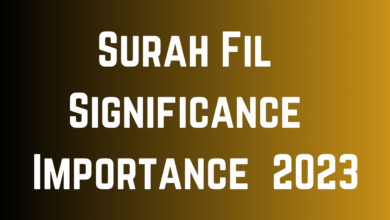What is the Meaning of Quran?
Unveiling the Essence of the Quran: A Journey into its Profound Meaning.

What is the Meaning of Quran?
The Quran’s meaning extends far beyond its words. It is a comprehensive guide that provides insights into the purpose of life, the nature of reality, and the moral framework for personal conduct and societal harmony.
Is Eddie Murphy Muslim? Truth Behind His Religious Beliefs
Can a Muslim Man Marry a Christian?
Do Muslims Celebrate Birthdays?

Introduction
The Quran, often referred to as the Holy Quran or the Noble Quran, is the central religious text of Islam. It holds a revered position in the hearts and minds of over a billion Muslims worldwide. The Quran is believed to be the literal word of God, as revealed to the Prophet Muhammad through the Angel Gabriel over a period of approximately 23 years. Beyond its linguistic beauty, the Quran carries profound meaning that transcends time, culture, and language.
The Divine Message

At its core, the Quran is a comprehensive guide to life, offering spiritual insight, moral guidance, and laws for personal conduct and societal organization. Its meaning goes beyond mere words; it is seen as a roadmap for leading a fulfilling and purposeful life. The Quran addresses the fundamental questions of existence, the nature of reality, the purpose of life, and the afterlife, providing a holistic framework for understanding the world and one’s place in it.
Unity in Diversity
One of the remarkable aspects of the Quran is its universality. While revealed in Arabic to the Arab people of the 7th century, its message is intended for all of humanity, regardless of nationality, ethnicity, or time period. The Quran acknowledges the diversity of human beings, emphasizing that people were created into different nations and tribes to know one another. The Quranic verses promote unity, equality, and understanding among people, encouraging them to transcend their differences and work towards a just and harmonious society.
Spiritual Enlightenment

The Quran is often described as a source of spiritual enlightenment. Its verses delve into the depths of the human soul, addressing human desires, emotions, and challenges. The Quranic message revolves around the importance of sincere worship, self-purification, and mindfulness of God in all aspects of life. It teaches that through prayer, contemplation, and adherence to ethical principles, individuals can find inner peace and a deep connection with the Divine.
Ethical and Moral Guidance
Ethics and morality are central themes in the Quran. The text outlines a comprehensive ethical framework, emphasizing values such as honesty, compassion, justice, and humility. It presents stories of prophets and historical events as lessons in moral conduct, demonstrating the consequences of both righteous and unethical behavior. The Quranic teachings encourage believers to uphold high moral standards and to treat others with kindness and empathy.
Social Justice and Compassion
The Quran is a strong advocate for social justice and compassion. It calls for the support of the less fortunate, the orphaned, and the oppressed. Charity (zakat) and acts of kindness are deeply ingrained in Islamic teachings, reflecting the importance of empathy and societal responsibility. The Quranic message urges believers to stand up against injustice, oppression, and tyranny, fostering a sense of collective responsibility for creating a fair and equitable society.

Guidance for Personal Development
Personal development and self-improvement are key aspects of the Quranic message. It encourages believers to seek knowledge, to reflect on the signs of God in the universe, and to engage in critical thinking. The Quran emphasizes the pursuit of knowledge as a means to deepen one’s understanding of God’s creation and to contribute positively to society. This encouragement for intellectual growth has historically driven Islamic civilizations to make significant advancements in various fields, including science, mathematics, medicine, and philosophy.
Conclusion
The Quran’s meaning is profound and multifaceted. It offers guidance for navigating the complexities of life, fostering spiritual growth, and promoting ethical behavior and social justice. Its universal message transcends time and cultural boundaries, uniting believers from diverse backgrounds under a shared understanding of God’s wisdom. For Muslims, the Quran is not merely a book of words, but a living embodiment of divine guidance that continues to illuminate their path in an ever-changing world.

Faqs
What is the Meaning of Quran?
The Quran’s meaning extends far beyond its words. It is a comprehensive guide that provides insights into the purpose of life, the nature of reality, and the moral framework for personal conduct and societal harmony.
Is the Quran’s meaning the same for everyone?
While the core message remains consistent, individuals may derive different insights from the Quran based on their personal experiences, cultural backgrounds, and levels of spiritual understanding.
How does the Quran address different aspects of life?
The Quran addresses various aspects of life, including spirituality, ethics, social justice, family, governance, and personal development. It offers guidance on how to live a balanced and meaningful life.
Is the Quran’s meaning limited to religious matters?
No, the Quran’s meaning goes beyond religious matters. It encompasses a wide range of topics that are relevant to personal and societal well-being, including interactions with others, ethical decision-making, and pursuit of knowledge.
Does the Quran’s meaning promote unity or division?
The Quran emphasizes unity among humanity and discourages division based on factors such as nationality, ethnicity, or social status. It encourages mutual understanding and cooperation.
What role does the Quran’s meaning play in personal development?
The Quran guides individuals toward self-improvement by promoting qualities such as patience, humility, gratitude, and compassion. It encourages believers to reflect on their actions and intentions.
How does the Quran guide ethical behavior?
The Quran provides a moral framework by outlining virtues like honesty, justice, kindness, and empathy. It also shares stories of historical figures as moral examples.
Does the Quran address contemporary issues?
Yes, the Quran’s principles can be applied to modern challenges. While it was revealed in a specific historical context, its teachings are often flexible enough to address current ethical and social concerns.
What is the Quran’s stance on social justice?
The Quran emphasizes the importance of social justice by advocating for the rights of the marginalized, supporting charitable acts, and standing against oppression and inequality.
How does the Quran balance spirituality and practicality?
The Quran intertwines spirituality with practical guidance. It encourages believers to engage in worship and prayer while also addressing the practical aspects of daily life.




